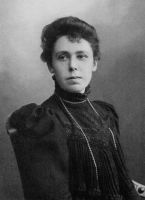Category:
Scientist
Motto: „
Ich legte mein Ohr auf den Boden.“ (I put my ear
on the earth).
My personal
view of Margarethe von Wrangell:
Reading her biography I was much impressed in the
fact, that her mother helped her as much as she could in her career. Besides
this, her biography shows clearly that in Margarethe's lifetime already women
existed who thought globally about the problem of nutrition. Another point of
my admiration is to see how she built up her scientific career with persistence
and endurance. She became the first woman professor in Germany. Now in
Baden-Württemberg a habilitation stipendium for gifted women scientists bears
her name. At this moment two excellent women scientists at Ulm University
profit from this stipendium. They are able to
continue their studies for 5 years to become a professor. ( There is a
statistic deficit of women professors in Germany).
Biography
Coming from a German-Baltic landowner family she went
to school in Reval and became a teacher. She passed her examination with
distinction. In the following nine years she gave private lessons in
natural science. Though her relatives did not agree with her,
she made up her mind to study. As at
this time it was impossible for a woman to study in her country, she went,
assisted by her mother, to Tübingen (Baden-Württemberg ). She was one of the
first women who studied there. In her free time she engaged herself in sports,
played tennis, did horse riding and rode her bicycle with professors and
students even to Venice. But her main interest was her academic career. She
took a doctor's degree in Chemistry and Biology. Then she went back to Estland
where she became manager of a research center of agriculture. This was of great
importance on account of nutrition problems in the First World War. She
examined there the need of plants for phosphor. 1918 her work came to an end
due to the Russian Revolution.
As her name was already well-known in the scientific
world, she could continue her
research work
at the Agricultural University of Hohenheim near Stuttgart. The center
of her work was fertilizing plants with phosphate. On account of her
international reputation the German Government gave her money for an plant
institute in Hohenheim, which was built according to her plans.
In 1923 she was the first woman professor in Germany,
but many male professors in Hohenheim envied her this position. She believed
that she had to pay for her career with her private life. In 1928 however she
married a friend of her youth, Fürst Andronikow. in 1932 she died at the age of
55 years. There is a Margarethe von Wrangell street in Ulm.
Literature
- Andronikow
Margarethe von Wrangell Das
Leben einer Frau München 1936
- Fellneth, Ulrich
Margarethe von Wrangell und andere Pionierinnen 1998
Kategorie: Wissenschaftlerin
Motto: Ich legte mein Ohr auf den Boden
Wie ich Margarethe von Wrangell sehe
Als ich ihre
Biografie las, beeindruckte mich die Tatsache, dass ihre Mutter so gut sie
konnte, sie bei ihrer Karriere unterstützte. Im übrigen zeigt ihre Biografie
deutlich, dass es zu Lebzeiten von Margarethe schon Frauen gab, die global über
das Problem der Welternährung nachdachten. Ein anderer Gesichtspunkt für meine
Bewunderung ist, wie sie ihre
wissenschaftliche Karriere mit Hartnäckigkeit und Ausdauer aufbaute. Sie war
die erste weibliche Professorin in Deutschland. In Baden-Württemberg trägt zur
Zeit ein Habilitationsstipendiun für begabte Wissenschaftlerinnen ihre Namen.
Augenblicklich haben zwei exzellente Wissenschaftlerinnen an der Ulmer
Universität dieses Stipendium erhalten. Sie können fünf Jahre lang ihre
Forschungen betreiben, um Professorin zu werden. (Es gibt ein statistisches
Defizit weiblicher Professoren in Deutschland.)
Biografie
Margarethe
von Wrangell stammte aus einer deutsch – baltischen Grundbesitzerfamilie. Sie
ging in Reval (heutiges Tallin) zur Schule und wurde Lehrerin. Ihr Examen
machte sie mit Auszeichnung. In den folgenden neun Jahren gab sie
Privatunterricht in Naturwissenschaften. Obwohl ihre Verwandten dagegen waren,
fasste sie den Entschluss zu studieren. Da
es zu dieser Zeit keine Möglichkeit für eine Frau in ihrem Land zu
studieren gab, ging sie, unterstützt von ihrer Mutter, nach Tübingen (
Baden-Württemberg). Sie war eine der ersten Frauen, die dort studierten. In
ihrer Freizeit betrieb sie Sport. Sie spielte Tennis, ritt und machte mit
Professoren und Studenten sogar eine Radtour nach Venedig. Aber ihr
Hauptinteresse war ihre akademische Karriere. Sie promovierte in Chemie und
Biologie. Darauf ging sie nach Estland zurück und übernahm die Leitung
einer landwirtschaftlichen
Versuchsstation. Dies war wegen der Ernährungsprobleme im Ersten Weltkrieg von
großer Bedeutung. Sie untersuchte den Phosphorbedarf von Nutzpflanzen. Die Russische Revolution setzte 1918 dieser
Forschungsphase ein jähes Ende.
Da ihr Name
in der wissenschaftlichen Welt schon sehr bekannt war, konnte sie ihre
Forschungen an der Landwirtschaftlichen Universität Hohenheim bei Stuttgart
fortsetzen. Der Schwerpunkt ihrer Arbeit war die Phosphorsäureaufnahme von
Pflanzen im Boden. Auf Grund ihres internationalen wissenschaftlichen Rufs gab
ihr die deutsche Regierung Geld für den Aufbau eines Forschungsinstituts in
Hohenheim, das nach ihren Plänen gebaut wurde.
1923 war sie
die erste weibliche Professorin in Deutschland. Viele männliche Professoren in
Hohenheim waren neidisch auf ihre berufliche Karriere. Ihre Existenz fast ohne
Privatleben sah sie als den Preis an, den sie für ihre Karriere erbringen
musste. Erst 1928 fand sie in ihrem Jugendfreund Fürst Andronikow einen
Partner, der ihr Engagement akzeptierte. 1932 starb sie mit 55 Jahren. In Ulm
gibt es einen Margarethe von Wrangell-Weg.
Literatur
- Andronikow
Margarethe von Wrangell Das
Leben einer Frau München 1935
- Fellneth, Ulrich Margarethe von Wrangell und andere
Pionierinnen 1998




